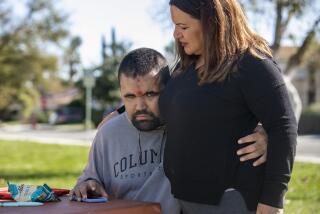A nursing home death, and a shocking phone call

The day Rita Kittower buried her husband last month, the 83-year-old widow from Tarzana thought she had endured the worst life had to offer.
She had bade a tearful goodbye to her mate of 49 years, who had passed away in an exclusive assisted living facility in Calabasas. “He just stopped breathing,” Kittower said she was told by a staff member.
With such a peaceful death, she thought, at least her husband Elmore would be free of the torment he had been feeling since losing much of his memory and independence after a severe stroke a year earlier.
“I thought it was meant to be,” she said.
Then came the anonymous phone call the day after the funeral.
A woman claiming to be an employee of the nursing home told Rita that her 80-year-old husband’s death had been anything but peaceful. She said Elmore Kittower had been beaten to death by someone on the staff.
Days later, detectives from the Los Angeles County Sheriff’s Department would pose a question that was almost inconceivable to the elderly widow.
Would it be OK, they asked, if they exhumed her husband’s body?
On a warm fall day in 1957 a young legal secretary by the name of Rita Druckman was washing her red Ford convertible outside her apartment in West Hollywood. As she sprayed the car with a hose, the son of the building’s owner -- a young man named Elmore Kittower -- walked by on the way to visit his parents.
“I hosed him by mistake and that’s how we met,” Rita recalled. The two were married six months later.
Elmore went on to have a successful career as an engineer and inventor, earning four patents along the way, two of them unpublished because they were classified by the U.S. Navy. The couple raised two children, a boy and a girl.
When Elmore retired in 1994, he and Rita settled into a life of going out for lunches and dinners with friends and walking their Belgian shepherd Bruin through their hillside neighborhood. Elmore tended to problems at the 10-unit rental property the couple owned in West Hollywood. He also volunteered as a math tutor at nearby Taft High School and read aloud to make recordings of books for the blind.
Such was the pace of life when Rita handed her husband the newspaper one day in August 2006 and then went about her morning routine.
Moments later, Elmore put the paper down.
“I can’t read this,” he told his wife. “It’s all blurry. The whole thing is blurry.”
Elmore was taken to Tarzana Hospital, where doctors determined he had a blood clot on the brain and had suffered a severe stroke.
He was in the hospital for about a month, followed by another month in rehab. At that point, Rita Kittower said, “they said we had to take him home or put him in a nursing home.”
Rita opted for home.
She hired a live-in male nurse, installed safety bars in the bathrooms and erected a railing along the sidewalk leading to the front door. But when she and a neighbor arrived to pick her husband up at the hospital, he was no longer the man she had known for so many years. She said her husband was angry that his memory -- and movement -- had been sapped by the stroke. He violently pushed a walker toward a nurse who was trying to help him. “He was out of control,” she said.
Back home, the once quiet and patient man she had known was combative and easily frustrated. He refused to take his medication. After just five days, Elmore ended up back in the hospital, this time in the psychiatric ward of another facility. Six weeks later, when Rita faced the same question of whether to take her husband home or put him in a nursing home, she felt there was only one answer: a nursing home. She perused literature and toured dozens of facilities, “none of them to my liking.”
Then, through a recommendation, she found a place called Silverado Senior Living in Calabasas. The place, an assisted living facility, specialized in taking care of memory-impaired patients such as her husband. She said she warned the staff that her husband could be combative and refuse to take his medication but was told that wouldn’t be a problem.
The price for such service wasn’t cheap. Rita said she paid nearly $75,000 a year for her husband to share a room with another patient.
“It was a hardship,” she said. “But it was a beautiful place, like a five-star hotel.”
Despite the pleasant surroundings, Rita’s visits with Elmore were difficult. He recognized his wife and grown daughter, Elise, when they arrived. But he would sit slumped in his wheelchair and barely spoke.
“What he did do, though, he would take my hand in his and he’d kiss my hand,” Rita said, breaking into tears at the memory. “And that killed me altogether. I felt so bad for him.”
On Sunday, Oct. 28, the Kittower family gathered at Silverado to celebrate Elmore’s 80th birthday. The following Sunday, Rita and Elise came back for their weekly visit.
It was the last time they would see Elmore alive.
Two days later, Rita had just finished walking Bruin when a sheriff’s deputy knocked on her door. He told her that her husband had died at 8:30 that morning. When Rita called the nursing home she was told that Elmore had “just stopped breathing.”
On Nov. 10, the day after her husband was buried, Rita received the mysterious call from a woman who identified herself only as Maria. The woman said she hadn’t slept in three days.
“She just couldn’t stand what she saw,” Rita said. “She had to tell me what happened.”
The woman said a staff member had punched Elmore in the eye and wrapped a towel around his head in an apparent attempt to suffocate him.
“I felt like I was going to throw up” Rita recalled. “I said I can’t listen to this.”
She hung up the phone, but not before getting the woman’s number. Rita asked her son to call the woman back. He elicited more details from the caller. When Rita asked about it, he said, “You don’t want to know.”
Rita asked her nephew, Paul Zwerdling, an attorney, to call the Sheriff’s Department.
As it turned out, sheriff’s officials already had their suspicions about Elmore Kittower’s death. The woman who called Rita Kittower also made an anonymous call to the Lost Hills sheriff’s station and mailed an anonymous letter to a nearby fire station.
Lt. Al Grotefend, a supervisor in the sheriff’s homicide unit, declined to discuss the case in detail. But he said detectives gathered sufficient evidence to warrant an exhumation. Authorities can dig up a body with a court order even if family members are opposed, but detectives sought Rita Kittower’s approval as a matter of courtesy and to make the process quicker.
Rita said she shuddered at the thought of her husband being cut up on an autopsy table and had a nightmare in which he was wheeled to the front door of their home in a casket.
But after consulting with family members, she agreed to the exhumation in order to “find out the truth” and protect any other potential victims.
Elmore Kittower’s body was removed from its grave in Eden Memorial Park cemetery Nov. 14. His remains were removed from his coffin and autopsied at the Los Angeles County coroner’s office.
The results were inconclusive, pending further tests, according to two law enforcement sources who asked not to be identified because they are not authorized to speak publicly about the case.
Both sources said there did appear to be some trauma to Kittower’s remains that was consistent with an assault.
Grotefend said detectives have questioned dozens of employees and residents of Silverado and developed a prime suspect in the case -- a caregiver who no longer works at the facility, he said.
The suspect was arrested shortly after Kittower’s death on suspicion of elder abuse, but the case was rejected by the district attorney’s office. The suspect has denied any wrongdoing, Grotefend said.
Grotefend said that the arrest was made before the exhumation and that detectives have since gathered additional information and plan to resubmit the case to prosecutors. The Times is withholding the suspect’s name at the request of authorities.
Mark Mostow, a spokesman for Silverado Senior Living, said the company had completed its own investigation and “found nothing to substantiate any wrongdoing.”
“These are strictly allegations,” he said.
Mostow acknowledged that the employee accused of assaulting Kittower had been terminated. But he said the firing was not the result of the alleged assault, but because the worker had violated an undisclosed policy.
Several other employees were also terminated following the death, he said, but they, too, were fired for policy violations, not for physically mistreating Kittower.
Zwerdling, Kittower’s nephew, said his uncle’s alleged treatment at Silverado seemed particularly unjust given the way he had lived his life.
“Elmore Kittower is a very decent man who died a very indecent death,” he said.
More to Read
Start your day right
Sign up for Essential California for news, features and recommendations from the L.A. Times and beyond in your inbox six days a week.
You may occasionally receive promotional content from the Los Angeles Times.







